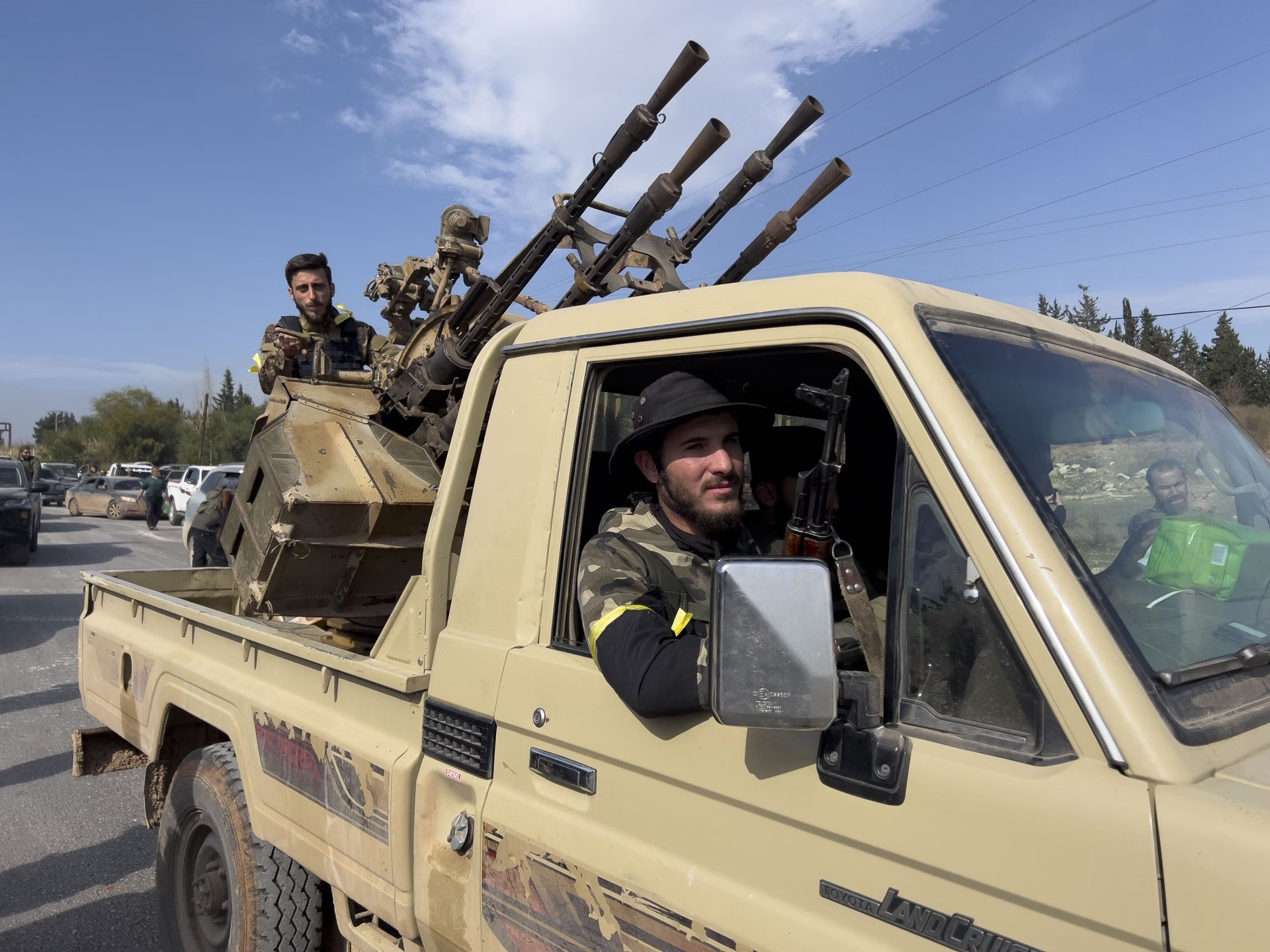The assailants, ostensibly aligned with Syria’s new administration, had overwhelmed the area in search of Alawites – a minority religious group to which Syria’s former leader, Bashar al-Assad, belonged, and Ibrahim was indeed an Alawite.
Al Jazeera’s verification team, Sanad, authenticated a video that identified Ibrahim’s body. Ibrahim’s cousin, Mazen*, whose surname remains undisclosed for safety reasons, informed Al Jazeera that many others were also killed during the attack.
“The attackers killed my pregnant friend and her three-year-old daughter, another friend who was a pharmacist, her doctor husband, along with my cousin and her 80-year-old mother-in-law,” Mazen reported to Al Jazeera.
Mazen struggled to understand why such violence had not been prevented.
Manufacturing Sectarian Hatred
Following the suppression of a popular uprising in 2011 by the Assad regime, men across the country took up arms either to protect their families or to overthrow the government.
President Assad smeared the opposition as “terrorists,” exploiting a narrative that his regime alone could safeguard Syria’s religious minorities. This led Alawites to fear persecution if the Assad government fell.
Despite this, many Alawites distanced themselves from a regime that violently repressed Syrians, predominantly targeting the Sunni Muslim majority.
Under Assad, civilians endured barrel bombs, chemical weapons, starvation, and torture, fueling sectarian violence that many Alawites remember vividly.
When the opposition ultimately overthrew the regime in December 2024, interim President Ahmed al-Sharaa pledged protection for minorities, giving Alawites hope for safety.
However, trust in al-Sharaa’s ability to protect Alawites was severely damaged following the March killings along Syria’s coast, as reported by Al Jazeera.

The Coastal Violence
On March 6, armed loyalists of al-Assad initiated assaults across the coastal region, killing hundreds, as per the Syrian Network for Human Rights (SNHR).
Violence persisted for four days, until Syrian security forces intervened to fend off the loyalist fighters.
Survivors, coupled with local monitors and analysts, report that an undetermined number of gunmen descended upon the area, performing apparently sectarian killings against Alawites.
By March 17, SNHR documented that at least 639 extrajudicial killings in reprisals had taken place, which are violations of international law and may be considered war crimes.
“Most counter-attacks lacked legitimacy, targeting civilians or fighters who were disarmed,” SNHR’s Fadel Abdul Ghany told Al Jazeera.
He added, “The main perpetrators are two armed groups aligned with the state who have joined the security forces.”
Syria’s Defence Ministry spokesperson, Abu Yasser Bara, confirmed they were investigating these allegations.
This violence raises concerns about President al-Sharaa’s ability to control armed factions with histories of human rights violations.
Following the December 2024 overhaul of al-Assad, Syria remained divided and heavily militarized.
The exact number of fighters who sided with al-Sharaa’s Hayat Tahrir al-Sham (HTS) to seize Damascus remained unclear, as different groups, including Turkish-backed oppositions and foreign fighters, were present across Syria.
Even if al-Sharaa brings factions under central control, regaining Alawites’ trust could be challenging.
“We don’t know who to trust now,” said Maryam*, an Alawite from Latakia. “We don’t know if this was intentional from the government or just a loss of control over some savage factions.”
Maryam recounted how fighters had entered her friends’ homes to verify their religious affiliations.

Out of Control?
After loyalists commenced their attacks, a Telegram channel that previously coordinated between Syrian opposition groups encouraged mobilization against these forces to support security forces in crushing the loyalists.
Although this call was soon retracted, many fighters had already arrived in the coastal area.
SNHR’s Abdul Ghani attributed a limited involvement of foreign fighters to the revenge killings, particularly implicating the Suleiman Shah Brigade and the Hamza Division Brigade.
These groups, sanctioned by the US for violence, operate under the Turkish-backed Syrian National Army, which, while aligned with the transitional government, maintains a separate command structure.
The stability of Syria largely depends on the government’s ability to fund such consolidation efforts, hindered by Western sanctions, according to experts.
Joseph Daher, a Syria economy expert, highlighted the need for international investment in productive sectors rather than just the security sector, to prevent military dominance and infrastructure decay.
To stabilize Syria, authorities should also address past abuses and punish those guilty of violating human rights, as emphasized by rights groups and victims.

Security and Accountability
President al-Sharaa has established two committees in response: one investigating the March 6 attacks and subsequent violence, and another aimed at winning back the trust of the Alawite community.
INforming Al Jazeera, Crisis Group’s Drevon underscored the necessity for holding human rights violators accountable and ensuring new opportunities for Alawites to integrate and contribute to Syria’s reconstruction.
Future Prospects
SNHR supports al-Sharaa’s initiative, but suggests the inclusion of independent human rights monitors and Alawite community members in these committees for increased trust.
As of publication, no government response had been received to Al Jazeera’s inquiries regarding SNHR’s suggestions.
Many Alawites in Syria are skeptical about potential reconciliation with the government in the wake of the trust deficit.
Recovery from these incidents could be unlikely if extremists are allowed to operate without punishment.
Thousands of Alawites have since sought refuge in nearby areas, questioning any future in Syria for themselves and their families.
* Names have been changed for individuals’ protection







